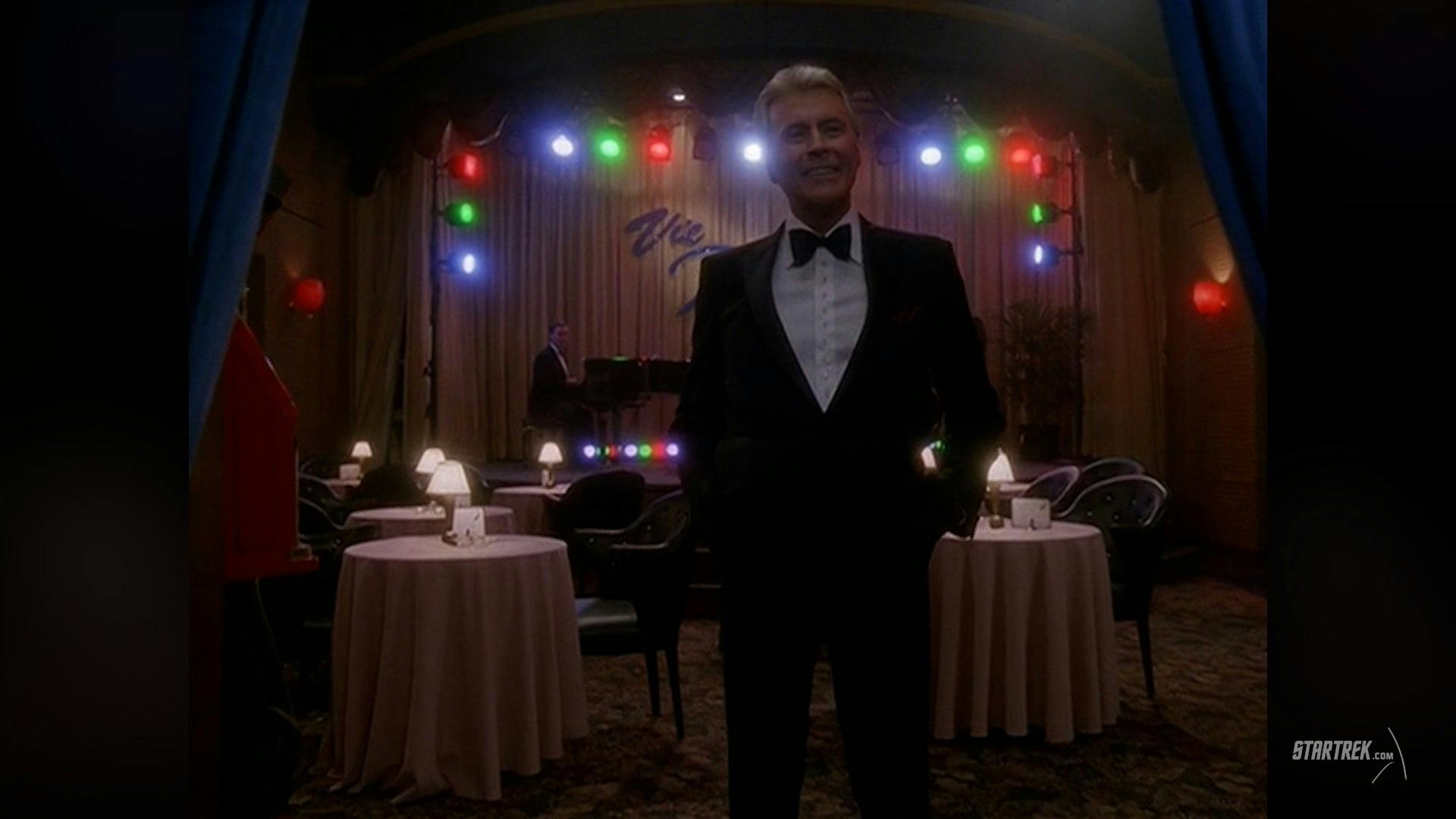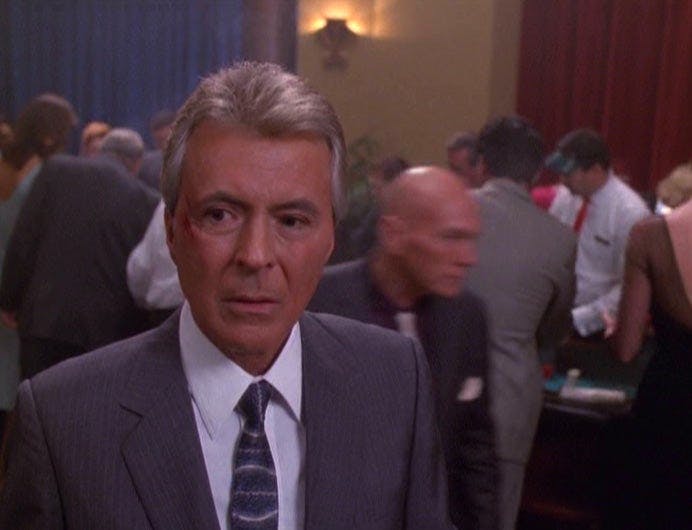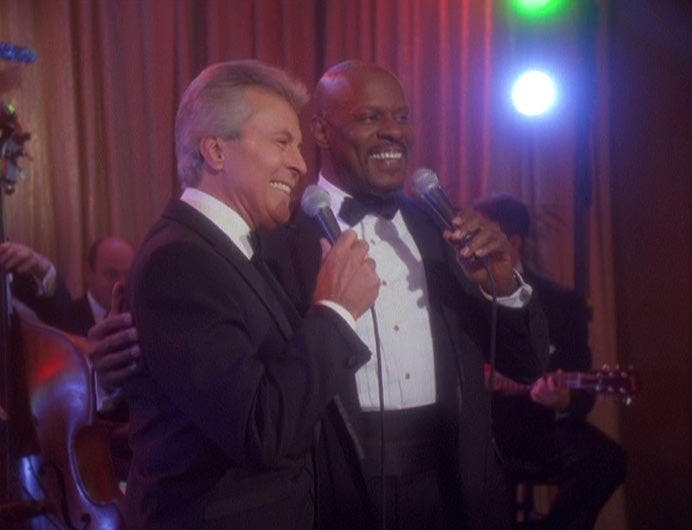Published Feb 24, 2021
EXCLUSIVE: Celebrating Badda-Bing, Badda-Bang with James Darren
Take a trip to the holodeck with the actor behind Vic Fontaine.

StarTrek.com
James Darren’s talent for entertainment has taken him “All The Way” from his Philadelphia roots to Hollywood’s inner circles. Whether running with the Rat Pack or portraying Vic Fontaine on Star Trek: Deep Space Nine, the singer and actor made his presence known with style and gravitas. Serving as a source of wisdom during his tenure on Star Trek, Darren was placed front and center in “Badda-Bing, Badda-Bang,” an ode to classic casino heist films. Written by Ira Steven Behr and Hans Beimler, the episode provided the space station’s residents with a respite from the brutality of the Dominion War.
StarTrek.com caught up with Darren to chat about filming the Las Vegas-inspired episode, becoming a part of the DS9 crew, singing alongside Avery Brooks, and much more.

StarTrek.com
StarTrek.com: Thanks for taking the time to chat with us, James. “Badda-Bing, Badda-Bang” is a very unique installment of Star Trek. When did you learn that the episode would focus on your character Vic Fontaine?
James Darren: You know, I was never given a head’s up. Ira [Steven Behr] is not only extremely brave and brilliant, but he pushes the envelope. Who else would have written episodes about 1950s era holographic singers in Star Trek? When they first asked me about playing Vic in Star Trek, I thought they were kidding. I didn’t want to play a singer because I am a singer. I wanted to play something a bit different, like a Ferengi or something [laughs].
The idea of doing “Badda-Bing, Badda-Bang” came as a surprise to the entire cast, but Ira is never short on surprises. He comes up with these wonderful ideas that you just can’t believe. I learned about that show when everybody else did, maybe a week or so before we received the scripts. The concept was thrilling to me, I loved it. You don’t really feel it until you start to get into it and begin performing. When I first read the script and saw where Ira was taking it, I thought he did a great job, as usual.
Did you feel any extra excitement over the opportunity to be in an episode that was inspired by the Rat Pack film Ocean’s 11?
JD: Well, it brought me back to that era that I knew so well. Having the pleasure of knowing Frank Sinatra, Dean Martin, and Sammy Davis Jr. — they were all friends to me. The whole era was a special time of life, so I could see why Ira loved it so much. I remember the good times I had hanging out at the lounge at the Sands [Hotel and Casino] with Frank, Sammy, Nancy [Sinatra] Jr., and lots of Frank’s other friends after his show. I’d give up a year of my life to spend just a week back there, that’s how special those times were.
Were you able to have any influence on the episode’s story or dialogue? For example, we learned that Vic hailed from your hometown of Philadelphia.
JD: All of those elements were Ira’s, I can’t take any credit for that. As an actor, Ira’s writing brought me back to that time. Ira is a tremendous fan of Sinatra, Dean, Sammy, and the whole Rat Pack era. When you’re playing a role in a story that takes place in a period you’re familiar with, your brain turns those old memories back into reality. You feel as if you’ve been here and done this before. It’s a strange thing to try to explain, but having lived through that time- well, recreating it was exciting as hell.

StarTrek.com
The DS9 crew always went out of their way to show their appreciation for Vic, and their dedication to him was at its height in “Badda-Bing, Badda-Bang.” Did their fondness for Vic reflect the atmosphere you experienced off-camera?
JD: It’s interesting, because when I did my first episode of DS9 [“His Way”], the cast and crew made me feel as if I had been there for years. I didn’t feel like an outsider coming in. They were very considerate with me. I don’t know if it was because they liked me, Jimmy Darren — but they were just so kind. Even some of them who didn’t necessarily associate with others in the cast, they all had a relationship with me.
Avery [Brooks] and I had a great relationship. I loved Avery, and René [Auberjonois], and Nana [Visitor], and Aron [Eisenberg]... everybody. There wasn’t a single person who I didn’t have a good relationship with, whether it was on the set, on screen, or off. They were all incredibly considerate and kind, to say the least.
I don’t know why Ira wrote [“Badda-Bing, Badda-Bang”] like that, maybe because he saw the friendship in real life. We all had great charisma between us, both on stage and between shots. I love the people. Not only because they were perfect for how they were cast, but because they were and are very nice people. Aron, I miss him — boy, he was a great kid.
The cast worked together for years, long before I was on the show. They had a nice rapport between them, which is pretty unusual. I’m happy that I fit in and that they accepted me the way they did. It made me feel very special.
You mentioned the late Aron Eisenberg, and his character Nog was one of Vic’s staunchest supporters. What was it like to work so closely with Aron on both “It’s Only A Paper Moon” and “Badda-Bing, Badda-Bang?”
JD: Aron was a true and dedicated actor. When I asked him to rehearse, he couldn’t believe it. In a series, people don’t often have the time to rehearse, but he would come up to my house and do the scenes over and over. Aron was a very special person, he was incredibly loving, warm, and fantastic to work with as an actor. He gave so much. The rapport between us was a natural thing, we just clicked. We got along great and often saw each other at events after DS9 went off the air. All of my relationships with the cast were like that. It was just like a family, but a family that got along [laughs].
Captain Sisko, played by Avery Brooks, explained his hesitancy to assist Vic with a powerful argument regarding racism in the early 1960s. How vital was it to highlight this crucial history lesson? Was Avery as hesitant to do the episode as his character was to participate in the heist?
JD: History is always important. Without history, there’s nothing to learn from. Avery was very private and kept to himself, but I [like to think] he could feel from me that there was not an iota of prejudice in my body. You read people by talking to them and being with them, and I think that’s why Avery opened up to me. Avery had a lot of say in all the shows — he was the main star. He could have really resisted [doing the episode] due to all of the horrible racism.
I came from an area of South Philly, and my family worked as migrant workers on a farm in New Jersey. Our neighborhood was diverse, and all the kids always played together. I just think Avery saw through me and into my soul. That might have had something to do with his decision to not fight against the script. He could have fought it, and he would have won. If Avery didn’t want to do something, well then he didn’t do it. As strong as Ira and the other producers were, Avery had the final say.
Do you recall any memorable moments that stood out to you while you were filming “Badda-Bing, Badda-Bang?”
JD: They’re all pretty special, in a sense. I knew that era so well, and every scene had something memorable in it. Filming reminded me of so many things I had done. I don’t mean robbing a casino [laughs], but just the feelings that Ira captured so beautifully in his writing. Every scene would ring an old chime in my head and bring memories that had almost been lost back to the front of my mind. It was almost like reincarnation, if that makes sense.
Did any of your co-stars manage to get caught up in their 1960s alter egos?
JD: I think they all did [laughs]. I know Aron and René absolutely loved being these aliens who were playing characters from that era. So they did get caught up, but they did it purposely as actors. The cast got carried away in a good way, because they were having a good time. They had a chance to leave their characters behind and become a bit like Vic. They entered into my zone, so to speak. I loved seeing them enjoying themselves on set, and I believe it really helped them understand where I came from.

StarTrek.com
You also had a chance to share the stage with Avery Brooks and sing “The Best Is Yet To Come.” What was that collaboration like?
JD: Avery is an incredibly talented guy. His roots as a singer are in jazz, but he’s also a wonderful pianist and a terrific musician. My favorite performance that I got to do on DS9 was the duet with Avery. I really had fun singing and interacting with him. Every feeling you saw on screen was real. It wasn’t our characters, it was Avery and I. We played off one another as Jimmy and Avery, not as Vic and Sisko. When we did that song, I had a ball. So did Avery. To have that moment was great.
Another thing I had a blast with during my time on DS9 was playing cupid with Kira and Odo [in the episode “His Way”]. I loved that I was trying to get Nana and René’s characters together, because I knew they cared about each other. Setting them up and arranging the whole date was a highlight for me, even though their characters got pissed at me [laughs].
You also recently put out a new album, correct?
JD: I did, it’s my first and only live album. It was recorded in Texas, but I didn’t originally intend to release it as an album- the sound mixes on all the songs simply turned out very well. The album, James Darren Live! For the First Time, is available on my website [JamesDarren.com], on Amazon, and at a few other places online.
Jay Stobie (he/him) is a freelance writer who has contributed articles to the official Star Trek website and Star Trek Magazine, as well as to Star Wars Insider and the official Star Wars website. Jay also serves as a part-time assistant and consultant advising many actors and creatives who work on his favorite sci-fi shows and films. He can be found on Twitter and Instagram at @StobiesGalaxy.

